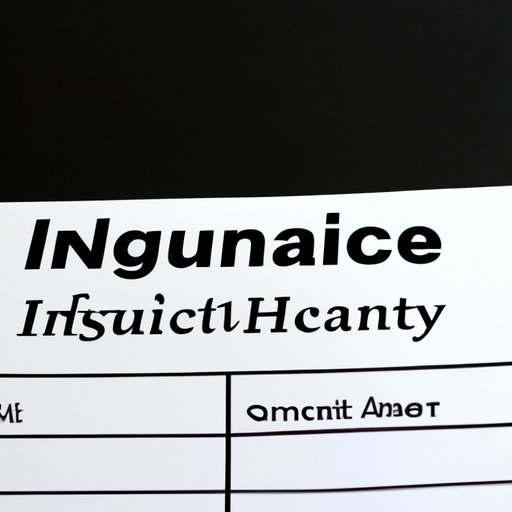
Introduction
Health insurance is an essential part of our lives, especially during times when medical emergencies may arise. However, did you know that certain life events can qualify you for health insurance outside of open enrollment? In this article, we will discuss what qualifies as a qualifying event for health insurance and why it is essential for consumers to know their options.
The Most Common Qualifying Events for Health Insurance Explained
Qualifying events can fall into two broad categories: open enrollment and qualifying life events. Open enrollment is a specific period when individuals can sign up for or make changes to their health insurance coverage. Qualifying life events, on the other hand, are life changes that allow individuals to enroll in health insurance outside of the designated open enrollment period.
Open enrollment periods typically are at the end of a calendar year. It provides an opportunity for individuals to sign up for or change their health insurance plan. However, if you missed the open enrollment period, some life events can allow for enrollment outside of open enrollment.
Qualifying life events include marriage, birth or adoption of a child, loss of coverage, and significant changes in life circumstance. These events can provide a unique opportunity for individuals to enroll in or make changes to their health insurance coverage outside of the open enrollment period.
Examples of qualifying events include getting married or divorced, losing job-based health coverage, having a child, adopting a child, or a significant change in income — such as job loss or a pay cut.
Don’t Miss Your Chance: Understanding Qualifying Life Events for Health Insurance
Understanding qualifying life events is essential if you want to take advantage of opportunities to enroll in or make changes to health insurance coverage outside of open enrollment. Qualifying life events include getting married or divorced, losing health insurance coverage, having a child or adopting a child, moving to a new coverage area, and significant changes in income.
When you experience a qualifying life event, you have a limited time window to enroll in or make changes to your health insurance coverage. Generally, you have 60 days from the date of the event to enroll or make changes.
If you had a change in income, it may impact your eligibility for a subsidy or government financial assistance to lower your health insurance costs. Therefore, it is essential to reach out to a healthcare marketplace representative or a licensed insurance broker to get the right guidance.

Breaking Down Special Enrollment Periods: The Basics of Qualifying Events for Health Insurance
Suppose you missed the open enrollment period and have not experienced a qualifying life event. In that case, you may have another chance to enroll in or make changes to your health insurance coverage through a special enrollment period. Special enrollment periods allow people with qualifying life events to apply for or change their health coverage outside the open enrollment period.
Examples of qualifying events that may trigger a Special Enrollment Period include losing health insurance coverage because of job loss, marriage, moving outside your insurance plan’s coverage area, and certain family circumstances such as having a baby or adopting a child.
It is crucial to act quickly when you have a qualifying event that triggers a special enrollment period. Generally, individuals have 60 days from the date of a qualifying event to enroll in or make changes to their health coverage. Acting fast can ensure that you have the necessary health insurance coverage when you need it most.
A Comprehensive Guide to Qualifying Events for Health Insurance
Aside from the most common qualifying events, there are other events that can make you eligible for a special enrollment period. These events include losing eligibility for Medicaid or Children’s Health Insurance Program (CHIP), aging out of a parent’s insurance plan, or getting a job that offers health insurance coverage.
Each qualifying event has specific rules and guidelines. For example, if you age out of your parent’s health insurance plan, you have 60 days to enroll in your own health insurance plan, regardless of the time of year. Similarly, if you get a job that offers health insurance coverage, you have 60 days to enroll in or switch your existing health insurance coverage.
It is essential to understand and navigate various qualifying events, as they can significantly impact your health insurance coverage and costs. Additionally, you should also know the penalties of not having health insurance coverage, which can result in a tax penalty.
Navigating Qualifying Events: What You Need to Know About Health Insurance Enrollment
Navigating qualifying events for health insurance can be complex, but breaking the process down can make it more manageable. Once you have experienced a qualifying life event or have determined that you are eligible for special enrollment, you need to take specific steps to enroll in or change your health insurance coverage.
Firstly, you need to find and compare health insurance plans at a marketplace. Next, you will need to fill out an application form with accurate information, following which you will receive a notice of eligibility and enrollment options. Finally, you need to choose a health insurance plan that meets your needs, sign up for the plan, and pay your first premium.
It is essential to understand that navigating the process of health insurance enrollment during a qualifying event can be confusing, and getting it wrong can be costly. Therefore, it is crucial to get help from a licensed health insurance agent or healthcare marketplace representative to obtain the necessary guidance.
The Importance of Understanding Qualifying Events for Your Health Insurance Coverage
Understanding qualifying events for health insurance is crucial for keeping yourself and your loved ones protected from unexpected medical expenses. Knowing the options available to you during qualifying events can help you enroll in or make changes to your health insurance coverage when you need it most. It can also help you save money by avoiding costly penalties for not having health insurance coverage.
Real-life examples of situations where knowledge of qualifying events helped individuals include those who lost job-based health coverage due to the pandemic, recently got married, or had a child. By understanding their options during these qualifying events, these individuals were able to find a suitable health insurance plan that met their needs and budget.
Qualifying Events and Your Health Insurance: What You Need to Remember
Remember that qualifying events can occur outside of open enrollment period and can be an opportunity for you to enroll in or make changes to your health insurance coverage. Qualifying events can be divided into two categories: open enrollment, and qualifying life events.
It is essential to understand the rules and guidelines surrounding different qualifying events to ensure you meet the eligibility criteria for a special enrollment period. Working with licensed insurance professionals, such as a healthcare marketplace representative or a licensed insurance broker, can help you navigate the complexities of the health insurance enrollment process during a qualifying event.





